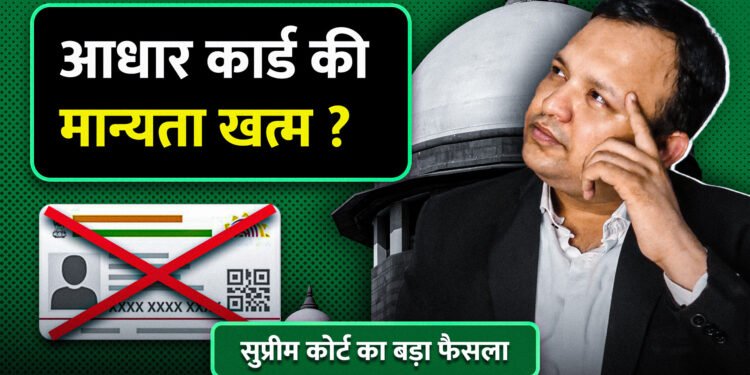Introduction
The Supreme Court’s judgment in Saroj vs. IFFCO-Tokio General Insurance Co. serves as a crucial milestone in understanding the role of Aadhaar as an identity proof in legal matters, particularly in compensation cases. This case brought to light the complexities of using Aadhaar for verifying personal details, such as date of birth, in the context of insurance claims. The Court ruled that while Aadhaar can serve as a valid proof of identity, it should not be considered as definitive proof of age, especially when conflicting documents exist. This article discusses the facts of the case, the legal principles explained by the Court, and the broader implications for legal claims and public policy.
To learn more about the topic, read the blog till the end, and if there lies any more doubt, feel free to reach out to us at; https://thelegalshots.com/legal-opinion/
Facts of the Case
Saroj, the claimant, sought compensation following a motor accident in which the victim sustained severe injuries. The key issue in this case was the verification of the victim’s age, which was crucial for determining the compensation amount, as the compensation was linked to the age of the victim at the time of the accident.
The dispute arose when there were discrepancies between the date of birth listed on the victim’s Aadhaar card and that on the School Leaving Certificate. The insurance company, IFFCO-Tokio General Insurance Co., contested the claim by asserting that the victim’s age, based on the Aadhaar card, did not match the school records.
Saroj, as the claimant, argued that the Aadhaar card should be accepted as a valid proof of age. However, the insurance company insisted that the School Leaving Certificate, which was presented as an alternative, should be the authoritative document for age verification.
Laws and Legal Principles Explained
- Role of Aadhaar Under the Aadhaar Act, 2016
The Supreme Court emphasized that the Aadhaar Act categorically positions the Aadhaar card as a tool for verifying identity and facilitating welfare schemes, but not as a primary document for verifying age or other unrelated purposes. - K.S. Puttaswamy v. Union of India (2018)
Referring to the landmark privacy judgment, the Court highlighted the limited scope of Aadhaar’s use, reiterating that it cannot be treated as an exhaustive document for all legal purposes. - Evidentiary Value of Documents
The Court stressed that a School Leaving Certificate, issued contemporaneously with the claimant’s early years, is a more reliable and authentic document for determining age. It carries greater evidentiary value as it is less prone to manipulation than recently created documents like Aadhaar cards. - Compensation Under the Motor Vehicles Act, 1988
The Motor Vehicles Act governs the calculation of compensation in motor accident cases. The Court noted that accurate age determination is critical for calculating compensation based on loss of earning capacity and dependency benefits.
Conclusion
In conclusion, the Supreme Court in Saroj vs. IFFCO-Tokio General Insurance Co. provided much-needed clarity regarding the role of Aadhaar in legal proceedings, particularly in compensation claims. The Court ruled that Aadhaar, while valid for identity verification, is not the final authority for proving one’s date of birth in the context of compensation claims. The School Leaving Certificate was considered the correct document to establish age, and this decision has implications for how legal claims and compensation are handled, especially in cases involving motor accidents and insurance.
My Point of View
The judgment in Saroj vs. IFFCO-Tokio General Insurance Co. highlights a crucial gap in how we perceive and use Aadhaar in legal processes. While Aadhaar is an effective tool for identity verification, its reliance for other purposes, such as age or residency proof, can lead to significant challenges. This decision upholds the sanctity of primary documents like School Leaving Certificates, ensuring accuracy in compensation claims and minimizing litigation risks.
From a legal perspective, this ruling reflects the judiciary’s commitment to standardizing documentation practices and protecting claimants from unnecessary procedural hurdles. However, it also serves as a reminder to individuals to maintain and preserve accurate records that hold evidentiary value in legal disputes.
Takeaways for Readers
- Verify and Maintain Documents: Ensure all key documents, such as School Leaving Certificates and other official records, are accurate and readily available for legal purposes.
- Understand the Role of Aadhaar: While Aadhaar is a valid proof of identity, it should not be relied upon as sole evidence for personal details like date of birth.
- Know Your Rights in Compensation Claims: In disputes involving insurance claims, ensure that the most credible and authoritative documentation is used to support your case.
- Seek Legal Assistance if Needed: If faced with similar challenges, consider consulting a legal expert to ensure your rights are protected and fair compensation is secured.
If doubts still persist, contact our Legal Experts at https://thelegalshots.com/legal-opinion/




